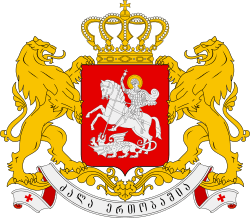Tianeti
Tianeti is a town in east-central Georgia, in the Caucasus Mountains. It is located at around 42°6′34″N 44°57′19″E / 42.10944°N 44.95528°E. Tianeti is the administrative center of Municipality of Tianeti, which also comprises the town of Sioni and 43 neighbouring villages (total area – 907 km²; population – 13,400, 2002 est.). It was known as Tionets during the Russian Empire's rule.
Tianeti is situated in the North-Eastern part of Georgia (Mtskheta-Mtianeti region). According to the 2002 State Census, its population was 3598 people (State Department for Statistics of Georgia, 2003: P. 47). As 2003 studies of poverty in Georgia suggest, Mtskheta-Mtianeti Region, and Tianeti district in particular, are among the poorest regions and districts of Georgia. In 2003, 63% of the population of Tianeti's populace was below the poverty line, compared to 47% of the Georgian population (Labbate, Jamburia, Mirzashvili, 2003: 21).
According to the Ministry of Labor, Health and Social Affairs of Georgia, as of November 2008, 14% of Tianeti families were receiving social assistance in December 2008, compared to 8% countrywide. During the Soviet times, Tianeti was a district (‘rayon’) centre. Several food processing enterprises, factories, as well poultry and meat producing farms were functioning in the district, providing employment opportunities for the local population (Georgian Soviet Encyclopedia 1979: 678-679). Soviet cultural, medical and educational infrastructure was also developed there. In 2008, Tianeti was still the centre of the municipality (which is the contemporary analogue to Soviet-era term ‘rayon’) with two secondary schools, two kindergartens, a vocational school, library, hospital and ethnographic museum. A municipal governance office, post office, and police station are also located in Tianeti. One of the Georgian banks has an office in Tianeti. There is a farmer’s market, where most of the population purchases food, and several private grocery stores. None of the factories and farms that operated during the Soviet time are working today, and no new enterprises have been established. A small part of the population works at state institutions (so called “budget jobs”: schools, hospital, local self-governance, post-office, etc.). Products and/or income from subsistence farming contribute to a significant share of the local economy. However, Tianeti has a shortage of arable land (Labbate, Jamburia, Mirzashvili, 2003:21). In addition, the climate is quite severe, thus sometimes the population is unable to harvest crops before the winter.
Adapted from forthcoming: Tamar Zurabishvili, Tinatin Zurabishvili. 2012. Remittances in Provincial Georgia: The Case of Daba Tianeti. In: Migrant Marginality: A Transnational Perspective. Routledge.


